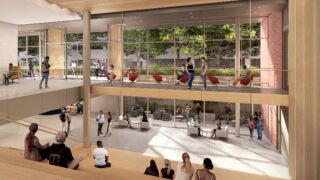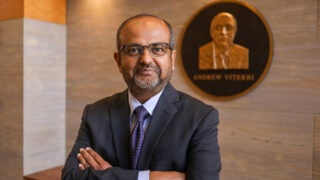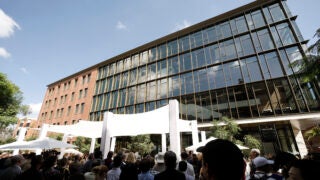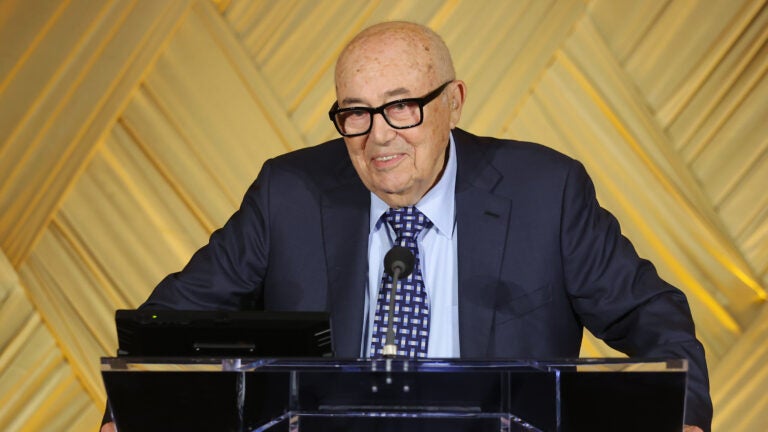
USC Life Trustee Andrew Viterbi invented the Viterbi algorithm and is one of the co-founders of Qualcomm Inc. (USC Photo/Greg Grudt)
Andrew Viterbi builds on a lifetime of innovation and giving
Viterbi’s $10 million gift boosts USC President Carol Folt’s Frontiers of Computing “moonshot” by funding the hiring of new faculty at the intersections of advanced computing and other academic disciplines.
When Andrew Viterbi began his doctoral studies at USC more than five decades ago, he had already left his mark on the world of engineering and computing. At the Jet Propulsion Laboratory in Pasadena, he had been the youngest member of the team that launched the first U.S. satellite, Explorer 1; his doctoral work at USC was largely based on his research into improving communication with spacecraft.
Little did he know that the engineering school that granted him his doctorate would one day bear his name.
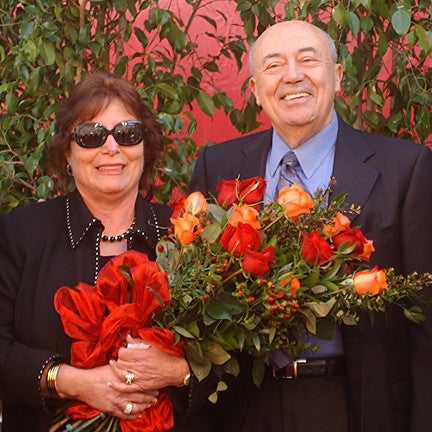
After a storied career as a scholar, inventor, entrepreneur and educator, Viterbi turned his attention to helping train future generations of tech innovators. Among their many philanthropic efforts, Viterbi and his late wife, Erna Finci Viterbi, gave the naming gift to USC Viterbi 20 years ago — the largest naming gift to an engineering school in history at that time.
Now, Andrew Viterbi has given another major gift in support of hiring new interdisciplinary faculty at the just-launched USC School of Advanced Computing.
The new gift of $10 million establishes an endowed fund to support the recruitment of new distinguished chairs to lead the formation of “faculty affinity groups” at the new USC School of Advanced Computing. Programs related to health, sustainability and security are slated to be among the first chairs endowed.
“This gift is in support of people,” said Viterbi, a USC life trustee who invented the Viterbi algorithm and is one of the co-founders of Qualcomm Inc., a pioneering firm in producing integrated circuits for both satellite and terrestrial communication, including billions of cellular phones. “I believe in hiring the best professors, which then allows you to build whatever you want to build.
Viterbi gift to enhance teaching, attract the best students
“Faculty with great reputations not only enhance the university’s teaching and research, but more importantly, they attract the best students to follow in their footsteps, rejuvenating the institution and training their successors to preserve our nation’s leadership in science and technology,” he said.
USC President Carol Folt has also allocated $5 million in matching funds from an existing Lord Foundation gift to further enhance the endowment for hiring distinguished chairs at the School of Advanced Computing, which was established this year within USC Viterbi as part of Folt’s Frontiers of Computing “moonshot.”
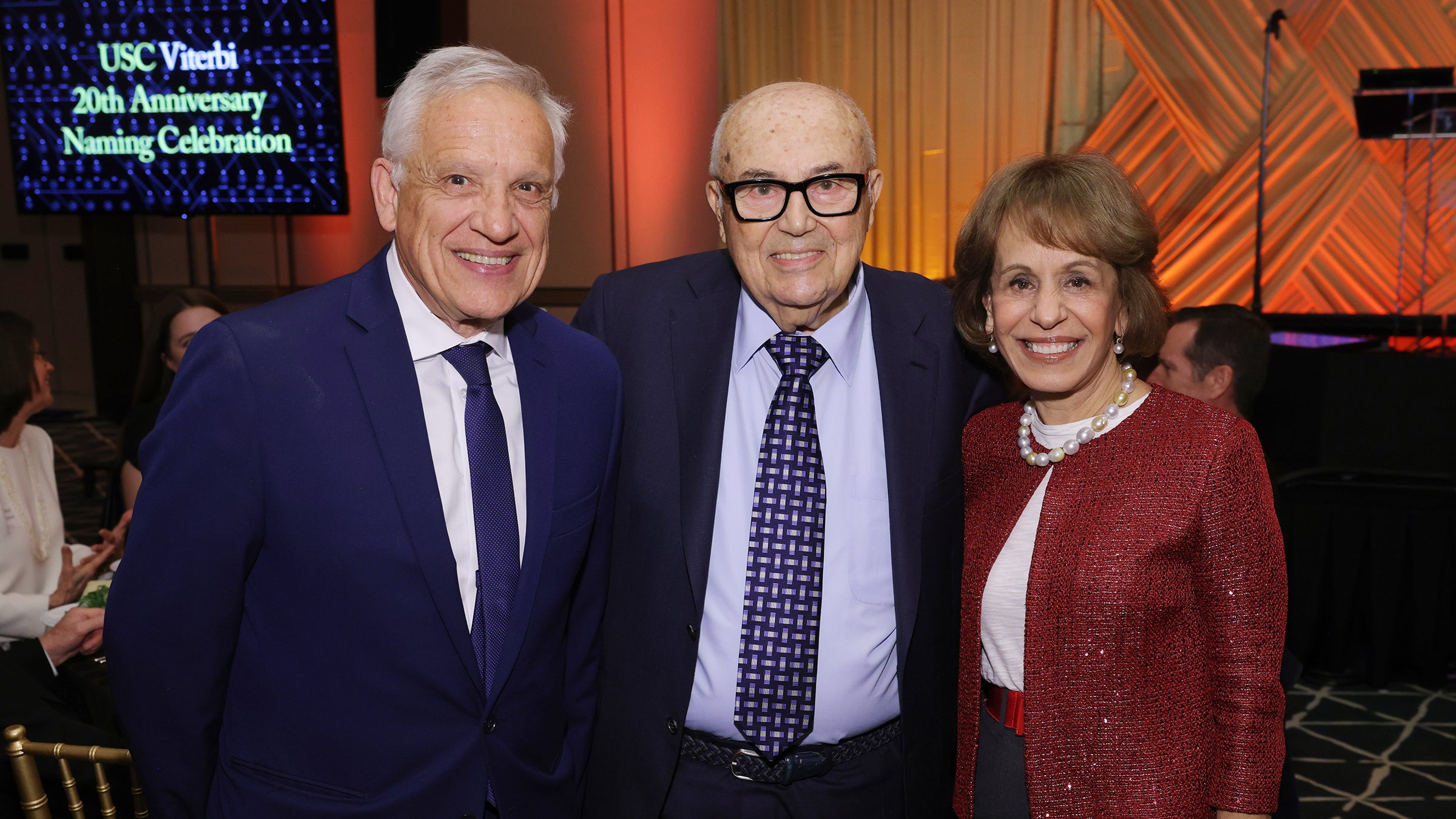
“These distinguished chairs connect advanced computing at USC with the university’s other schools, departments and disciplines, from medicine to social sciences,” Folt said. “Great faculty power Frontiers of Computing — and the incredible generosity and legacy of Dr. Viterbi ensures our students have access to world-class leaders and top researchers in their fields. I’m especially inspired by the intersection of disciplines that leads to new discoveries supported by this lead gift.”
Yannis C. Yortsos, dean of USC Viterbi, said the school has been “immensely fortunate and proud” to be associated with the Viterbi family. “This new gift further demonstrates Andrew’s commitment to engineering education and to making a better world for all,” he added.
Viterbi gift: Legacy of a ‘computing pioneer’
“Andrew Viterbi is a computing pioneer,” said Gaurav Sukhatme, director of the School for Advanced Computing and executive vice dean of USC Viterbi. “His new gift, which will support the work of faculty in diverse areas of computing, reaffirms his commitment to the ideals of a research university. We are very grateful to him and the Viterbi family for their enduring support.”
Sukhatme said that the distinguished chairs will become the leaders of faculty affinity groups at the intersections of advanced computing and other academic disciplines. Those disciplines will likely include:
- Health to advance personalized medicine, drug discovery and development, medical image processing and analysis, patient data security, health care delivery, and health and medical data analytics.
- Sustainability to advance decarbonization, energy transition, climate change adaptation, and all matters of sustainability, from transportation to energy transition to urban environments and agriculture.
- Social sciences to explore the application of advanced computing in societal organization; understanding social phenomena; formulating fair, equitable and unbiased policies; and helping to end homelessness, build resilient communities and defend democracy.
- Security to advance cybersecurity, threat detection and prevention, logistics and supply chains, and the identification of misinformation.
- Scientific discovery to accelerate research and advancement in all sciences — physical, chemical, biological, social — with a human- and planet-centric focus.
- Arts and humanities to explore the intertwining of digital technology and humanity on artistic and humanistic expression, creating new philosophical and ethical viewpoints and enriching life for all.
- Quantum computing to explore the frontiers of computing, sensing and communications based on quantum phenomena.
For Andrew Viterbi, the kind of collaboration these new distinguished chairs will promote is a logical extension of the support he has given USC for the past three decades.
“Collaboration among faculty, whether in the same department or in other departments, is what pushes us ahead,” Viterbi said. “Working with colleagues, especially colleagues with different academic backgrounds, is a great way to test your ideas — and once they’re polished, sharing them with students is the next great test.”

